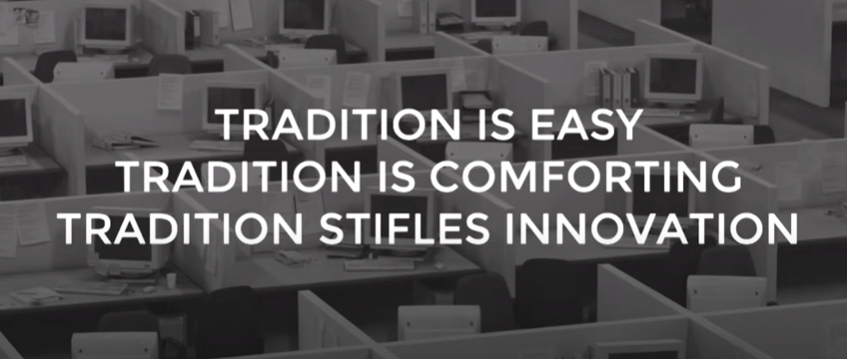
How to manage people successfully: styles, methods and mistakes
If you're not self-employed or a solo entrepreneur, then the question of how to manage employees becomes very important.
Only having a well-built personnel management strategy can we expect a high level of work. This does not mean at all that you will have robots that will no longer cause problems, but within the system, the human factor affects the result much less.
Let's start off with a little story
I've never completely cooperated with the rules of my traditional workplaces. The Monday to Friday, 9 to 5 grind just isn't for me. I'll never forget the last time that I was called out for being late at work.
It was very early in my career and I remember showing up one morning at 9:15 a.m. casually strolled in only to find my boss standing beside my desk arms crossed tapping his watch with disapproval.
'This is unacceptable' he said. 'I can't remember the last time you were here before 9:00'.
Well damn good morning to you too sir. Did I miss anything?
Now of course I knew that I hadn't. I've been connected to my work in a dozen different ways. Check my calendar the night before & I'd been on my email all morning.
I had my notifications on Facebook, Twitter, WhatsApp or internal messaging system if my clients or my team wanted to get a hold of me they would have already done so and that's when my boss hit me with this:
'The stock market opened 15 minutes ago'
What my work have to do with the stock market I didn't know. This was a marketing agency, I was doing graphic design.
I saw what was happening, I was being sacrificed at the altar of office discipline.
So I asked a rhetorical question: 'Did something happen that I should know about?'
And of course they knew nothing had happened I've been on Twitter all morning and I looked at the trending topics and the only thing newsworthy was Kanye West and Kim Kardashian attending a jay-z concert the night before.
That's when my boss hit me with this:
'You being late is bad for morale, it looks like you aren't pulling your weight around here.'
Ooh that one stung. That one hurt and that's the moment I decided to quit.
The insinuation that I wasn't producing because I wasn't physically tethered to my desk. It was a bit too much for my pride. Anyone who knows me, knows that I'm highly productive I'm a consummate team player.
But apparently I didn't look the part.
For my last two weeks on the job I would show up early show up every morning at 8:55 a.m. I would sit at my desk and do one thing and one thing only.
I marathoned movies. Naturally I started with The Godfather. Great place to start.
I made my way over to Star Wars and no marathon would be complete without the Lord of the Rings extended version.
Every day I would leave at 5:00 p.m. I pass by his desk at 5:00 p.m. and he would say 'Great job'.
I literally sat there for eight hours and watched movies. I did nothing, but that was enough for my boss. I swore from that moment onwards I'd never be managed again.

The management paradox
Organisations that are growing and achieving scale require management however people like myself and yourself don't like to be managed.
Which begs the question can millennials be managed or better yet should millennials be managed.
Now I'm part of the Generation Y, critics of my generation have been quick to dismiss me as many things; entitled, lazy, disloyal unmotivated and selfish.
Considering that I quit my job over the fact that I couldn't show up 15 minutes late every single day, I suppose you could say some of those stereotypes are true.
The thing is, Generation Y now accounts for over 50 percent of the global workforce.

We're built for tomorrow's workplace because we grew up in an increasingly flat and connected world.
We're much more resourceful, innovative, entrepreneurial, nimble... I've got buzzwords for days.
How we work and why we work is fundamentally out of sync with the expectations of the traditional workplace. For instance I don't just have one employer I have a portfolio of work.
I don't just have one specialisation I have many of them.
I don't stay at one place for very long I do tours of duty/
I don't need an office, I'm connected to my work anywhere that I can get Wi-Fi.
So why is it that so many of us are still being managed like we work in factories?
Now if you trace back the echoes of this particular configuration of workplaces far back enough you might actually well end up in factories.
The Industrial revolution.
This time in our history saw organisations achieving scale, in order to manage this growth we have to elect managers
The entire eight-hour workday has its roots in this time.
Social reformer Robert Owen proposed that we divide our work into three equal parts for a day.
Rather into three equal parts, eight hours for work eight hours for recreation, eight hours for rest. This was a way to wrestle back work-life balance because at that time we were experiencing a rather adversarial relationship with our employers.
By the early 1900's management had become widely accepted and by the mid twentieth century for better or for worse.
perfect management
We began to develop theories about perfect management.
One such theorist by the name of Peter Drucker began to notice something, a bit of a paradigm shift.
He saw that we were moving away from the mere production of goods and the provision of advanced services to the use and manipulation of information.
He coined the phrase 'knowledge work'.
He said the most valuable asset of a 21st century institution whether business or non-business will be it's knowledge workers.
So what we need is a new managerial contract.
When you consider that when all of the value in an organisation walks out of the door each evening, the old command-and-control mindset is not going to work anymore.
The existing model doesn't make any sense.
It does not make sense for creative agencies.
it does not make sense for startups.
it does not make sense for think tanks.
it does not make sense for publications.
It does not make sense for the next generation which is trying to do creative work, entrepreneurial work or information based work.

So why are we doing this well because of tradition.
Tradition is easy tradition is comforting tradition is ultimately limiting, it stifles innovation.
It's doing things because that's the way it's always been done.
But let me tell you, doing things because that's the way it's always been done is a horrible reason to continue doing anything.
It forces managers of the next generation to develop a focus on management with a distinctly Theory Y approach.
In order to understand and appreciate Theory Y you first have to understand and appreciate Theory X
Theory X
Theory X assumes a lot of things it assumes that employees are lazy, that they avoid work and that they actually dislike work.
It's kind of like when your parents assigned you tasks or chores when you were young. Do the lawn, do the dishes... but you'd rather be doing other things.
Theory Y
Theory Y assumes the complete opposite.
Theory Y assumes that employees are ambitious that they're self-motivated that they exercise self-control and they actually enjoy their physical and mental duties.
Given the proper conditions an employer operating within the Theory Y framework and actually help their employees achieve the most elusive part of Maslow's hierarchy of needs.
That little point at the top of the triangle: 'self-actualization'. Only when given the proper conditions though, so what do those conditions look like.
How to manage knowledge workers
Let me tell you about how I run my ships.
I start from a place of a hundred percent trust I provide my teams with their areas of responsibility they have their goals they have their deadlines and I assume that they're here for the right reason and that they want to work and that they will do good work.
I provide them with space physical and otherwise.
Currently we have an office yes, but you're not physically expected to be there. You can work from the office, you can work from home, you could be in Bermuda with your shorts on for all I care.
As long as work is getting done on time and to a high degree of quality, why is there any need for me to actually track your hours.
It's dehumanising and degrading.
I believe in co-creation, I believe in building things together but I am not going to simply assign you something, expect you to do it let alone do a good job.
I'd rather invest you emotionally, in the process of producing whatever it is that we're producing.
I also I believe in leadership this is something I resisted for a long time but my teams have told me time and again that we need somebody who's gonna guide us. Someone to provide us with insulation from the more harsh realities of the organisation and the industry.
Frankly I believe in culture, I believe that people want to show up to a workplace that doesn't feel like a workplace. But feels more like a community where they can be among friends, where they can bring their whole selves to work.
I believe that we should create a workplace that is conducive to doing excellent work. Work that we're proud of.
I'm optimistic about the next generation because not only can we break the cycle, I believe we will break the cycle of doing things the way they've always been done and it's gonna come from understanding the fundamental difference between outcomes and outputs.
Antoine de Saint-Exupéry said if you want to build a ship don't drum up people to collect wood, don't assign them tasks and work but rather teach them to long for the endless immensity of the sea.
A focus on outcomes versus mere outputs.
Jay-z has a blueprint available that I defer to for the matter.
He's built up rock nation one of the most successful labels ever, he's a leader who manages other leaders.
He manages the likes of Kanye West, Rihanna, Jay Cole. The list goes on and he does so with a distinct focus on individuals. He doesn't just see the sum, he sees individuals, he sees a team of artists. People who are unique, have their own ambitions, who want to succeed on their own terms.
He nourishes that and creates an environment that has all of the aforementioned conditions.
Like Jay-z we work with people who who want to move the needle forward and push boundaries, people who are genuinely animated by their work.
Now you're wondering this seems too good to be true, it's a some sort of utopian workplace. I mean it's not without it's bumps but yes it does work.
I'm on my fifth creative team now. People that have worked with me have graduated on to work at places that are reputable organizations large agencies leading publications media companies.
We've won regional and national awards and on the company has grown to great strengths.
So yes it does work but how does it work?
I believe that if you want to do your best work if you want your team to do their best work you have to bring out the best in yourself.
I don't stand behind my team and say go I stand in front of them and say let's go.
I believe that you have to go to bat for your team when people work with you, they want to know that they're working with somebody that has their back. Someone who will go bat for them no matter what.
I believe that your best work happens when a manager isn't breathing down your neck and I provide stretch projects these are big audacious projects that scare you, that push you outside of your comfort zone and I believe that's where the real growth happens. Outside of your comfort zone.
Last but not least I get out of the way once I've empowered and motivated these teams. I take a step back and watch them take flight.
I want you to think about a leader in your life, a manager, a coach, a teacher, somebody who could call you for advice and ask you for a favour. They want your help with a project, something you would do for them. Someone you would give your best effort to, in fact I you'd go above and beyond the call of duty for.
Then ask yourself what is it about your relationship with this person that has put you in the right headspace to deliver. Something about you and them that has put you in the proper conditions conducive to doing excellent work.
Now let's revisit the management paradox one more time.
We're in a brand new era; the end of management, instead a focus on leadership at every level.
The role of management for the next generation
So what is the role of management for the next generation?
Absolutely nothing.
How are we gonna break out of this catch-22, how will we dismantle this paradox, how will we stop doing things the way they've always been done.
We're just gonna stop managing altogether.
I suppose in this way yes, I am a horrible boss.
I'm a horrible boss because I'm not a boss at all.
I'm just a friend, I'm a mentor I'm a comrade, I'm a resource, I'm a cheerleader and I'm a coach.
Coaches don't play ball they motivate and empower their teams to win championships.
They take a step back and watch them do it.
So I challenge everyone who is privileged enough to manage the next generation; please don't manage, lead instead.
Because you manage things, but you lead people.
Historic management practices
To ensure we don't make the mistakes of the past it's important to look back at the historic practices of management. Understand what did and didn't work and more importantly why.
Basic employee management styles
The general management style is adhered to by those managers who use scientific methods in organizing the current processes at the enterprise. They are distinguished by their exactingness, intolerance to bureaucratic delays and formalities in management. Below we will consider other approaches when the characteristics of the leader's personality prevail in the individual management style.
Authoritarian governance
The authoritarian style of managing subordinates implies the concentration of power in one’s own hands. In such a company, employees are waiting for decisions from their superiors on all issues, and the main motivational tool is various types of punishments (reduction of bonuses and bonuses, reprimands). If we talk about modern high-tech production, of course, this management style has no future. However, it is impossible to completely abandon it, it is effective if it is necessary to quickly get out of the crisis, cope with an accident, and eliminate the consequences of a catastrophe.
An authoritarian leader, in principle, is against "familiar" relations, he does not hold corporate meetings, he already understands how to manage employees and the company. Festive events are extremely rare. In such collectives, there can be no question of criticizing the decrees and orders of the authorities, a strict dress code and internal regulations are being introduced. Employees blindly fulfill what is required of them, do not seek to show initiative. Mostly insecure people who are not interested in a career and professional development are willing to work this way.
Democratic governance
The democratic style in management is manifested in the ability to organize the process in such a way that the leader only coordinates the actions of employees. He does not seek to take everything upon himself, but aims to inspire and direct his subordinates to independently solve the assigned tasks. In an enterprise where a democratic leadership style is adopted, decisions are made collectively, meetings, planning meetings, brainstorming sessions, etc. are held. The boss is not opposed to subordinates expressing their opinion, and criticism cannot be a reason for punishment. The main motivation in such a team is various types of rewards.
With all this, the manager remains a real professional leader, leading a team of like-minded people. He sets the direction, defines the purpose of the work, creates an inspiring atmosphere. For employees, joint entertainment events, trips, game trainings are held.
Liberal governance
The liberal leader uses both democratic and authoritarian methods of management in his work. We can say that the team uses certain liberties, and the boss himself prefers to stay a little away from the employees. He communicates with subordinates from the position of a consultant who delegates and distributes functions and production tasks. The work of such a leader is carried out mainly in the following areas:
Determination of the goals and strategies of the company.
Providing staff with information materials. Representation in external instances. Practice shows that the management style of a particular manager can include all of the above options, depending on the current situation. In addition, each person has their own character traits, level of professionalism, their own understanding and experience.
American model of personnel management
American style is based on three pillars - high competition, efficiency and focus on results.
Recruitment is carried out according to very strict rules, as people are embedded in the structure, as another decisive factor for success.
When hiring, a contract is drawn up for a certain period, and when it is completed or interrupted for another reason, the relationship simply ends without claims for further employment.
As a rule, it is more profitable for American companies to attract well-trained employees and qualified specialists than to engage in training, “grow” professionals in their team. There is always a danger that they will leave, tempted by better conditions, to a competing firm.
American style obeys the following principles:
The effectiveness of employees is constantly assessed; everyone strives for success and reaching new heights; each on his own, the predominance of individualism; the interaction between the boss and subordinates is clearly spelled out in the job descriptions.
Any American company can be compared to a money-making machine. And, if at some point the employee ceases to meet the requirements or his position is reduced in times of crisis, he will simply be fired.
At the same time, high competition encourages employees to constantly improve their skills (even without monetary compensation from the company) to increase their value as a specialist.
Japanese model of personnel management
By hiring a job in a Japanese company, an employee can be said to become a "family member" or clan. This management style is based on national traditions, a person can come to the company in his youth and work until the end of his career, gradually learning and moving up the career ladder.
The Japanese strive to create a calm and friendly atmosphere in the team with transparent and honest relations both between colleagues and with superiors. Trust is based on the ability to receive information about the plans, goals and results of the enterprise.
This method, with its inherent collectivism, has important original features:
The boss plays the role of a caring and strict father, he closely observes the development of subordinates and normal relationships in the “family”.
The employee is not afraid of losing his place; in his activities, he may deviate slightly from strict rules. Collective responsibility serves as the basis for a relationship of trust between superior and subordinate. The main strategy of Japanese companies, as opposed to American-style businesses, is that they are more focused on improving the quality of goods, rather than constantly increasing income. That is why Japanese products are recognized all over the world. The Japanese are proud of their belonging to the company where they work and care about its prosperity, while in the American, their own income and its growth are in the first place.
Social methodology of personnel management
In some studies in the field of management, a separate place belongs to social style. With such an organization of the case, the leader pays much attention to relationships in the team, as well as building trusting relationships with all subordinates. In his activities, he considers it necessary to create convenient and comfortable conditions for each employee. The social style is especially relevant when it is necessary to maintain psychological compatibility and minimize the possibility of conflicts in the workplace.
Each manager decides for himself how to manage employees correctly. However, there are also standard steps here:
Write down the system and rules for interaction and communication. Organize an efficient production process. Create a quality control system and formalize performance standards. To familiarize employees with the standards and rules of work.
Provide employees with job descriptions, familiarize them with their rights and responsibilities. All workplaces must be supplied with instructions, regulations or a checklist and samples of work performance.